UNIT 3 THE ENVIRONMENT AND US LESSON 15 教案-优质公开课-清华版一起5下精品
Unit-3-Lesson-1-Spring-Festival高中英语北师大版(2019)必修第一册

Lesson1 Spring Festival
P52 1
What does
mean to you?
What words immediately come to your mind for
describing its meaning?
the beginning of a new year China's biggest festival a day for family reunion
For Li Yan, Spring Festival is family time.
Read again. Find out each person's
Task 2 experience of Spring Festival in the
three accounts. Take notes.
P54 4
Activities during setting off and watching Spring Festival fireworks, enjoying a big dinner
Read Xu Gang's account and complete the chart.
Where and with whom
been kept.
Analyze the key points of the text
编者寄语
Notes from the editor: Spring Festival is an important
tradition in China. It has unique meanings. However, people may
新北师大高中英语选择性必修一Unit3 Lesson 1 (2)
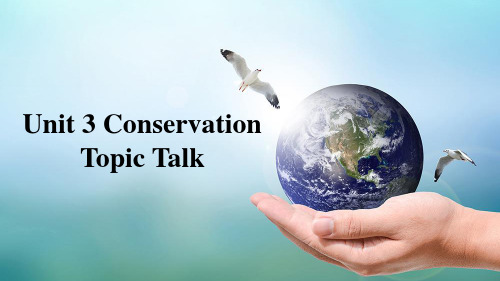
J: That’s very true. Did she say anything about using plastic bags?
M: Yes. She talked about how plastic waste is killing our oceans. It’s very clear—we all need to recycle and reduce the amount of waste we produce.
Human Activities farm and eat, work, travel, live
Things to be Protected the Earth, plants, oceans, forests, animals and the environment, our planet, our land
Why do they need protection?
What should we do?
...
Example: Our environment needs protection. We use cars too much, which is bad for both the environment and our health.
J: I totally agree. I think we should cut down the use of unrecyclable plastic to protect our planet.
M: That’s a good idea. But of course, as the professor said: “We all have a role to play in protecting the environment. If we all do our part, we can live a healthier life on Earth.”
Unit 3 Lesson1(教案)-高中英语北师大版(2019)选择性必修第一册
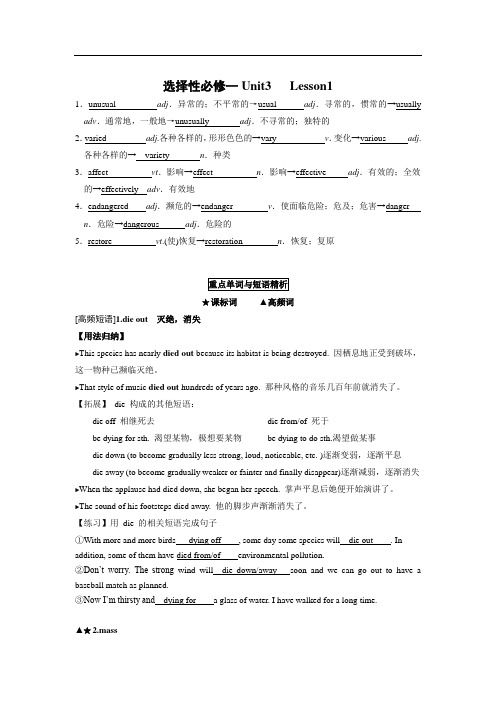
选择性必修一Unit3 Lesson11.unusual adj.异常的;不平常的→usual adj.寻常的,惯常的→usually adv.通常地,一般地→unusually adj.不寻常的;独特的2.varied adj.各种各样的,形形色色的→vary v.变化→various adj.各种各样的→variety n.种类3.affect vt.影响→effect n.影响→effective adj.有效的;全效的→effectively adv.有效地4.endangered adj.濒危的→endanger v.使面临危险;危及;危害→danger n.危险→dangerous adj.危险的5.restore vt.(使)恢复→restoration n.恢复;复原★课标词▲高频词[高频短语]1.die out 灭绝,消失【用法归纳】▶This species has nearly died out because its habitat is being destroyed. 因栖息地正受到破坏,这一物种已濒临灭绝。
▶That style of music died out hundreds of years ago. 那种风格的音乐几百年前就消失了。
【拓展】die 构成的其他短语:die off 相继死去die from/of 死于be dying for sth. 渴望某物,极想要某物be dying to do sth.渴望做某事die down (to become gradually less strong, loud, noticeable, etc. )逐渐变弱,逐渐平息die away (to become gradually weaker or fainter and finally disappear)逐渐减弱,逐渐消失▶When the applause had died down, she began her speech. 掌声平息后她便开始演讲了。
现代大学英语精读第3册lesson 1(课堂PPT)
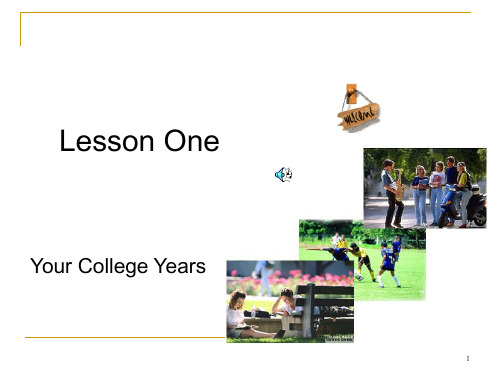
Your College Years
1
Consider the following questions:
What’s the difference between middle school life and college life?
What important changes have happened to you? What problems /difficulties have you come cross? Were you happy in the past year? List your progress/success and your loss/failure in
It (suddenly / never) occurs to someone that… It (suddenly / gradually) dawned on someone
that… It struck someone that…
14
2. From adolescence to young adulthood (para.1)
psychological independence (para.4)
1. Functional independence (4 aspects) 2. Attitudinal independence 3. Emotional independence 4. Relationship independence
the past year. Have you had a better understanding of your
strengths and your weakness?
2
Background Information
Unit 3《Animal World》Lesson 1(课件)人教新起点版英语六年级上册
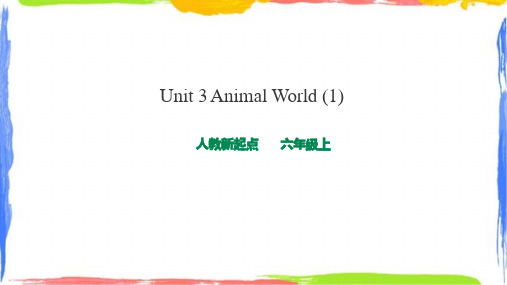
At last, they are going to see the penguins. Penguins are birds, but they cannot fly. They live on the ice. Look. How cute they are!
Snakes are reptiles. They are very long and cold.
Butterflies are beautiful animals. They are insects. They have six legs and they can fly.
例如 Next, they want to see some mammals. Such as monkeys, pandas to their babies.
A: What animals do you like?
B: I like penguins . They are birds , but they can’t fly. They can swim,
and they are cute.
A: What animals do you like?
B: I like sharks . They are fish . They swim very fast, and they are big.
A: What animals do you like? B: I like butterflies . They are insects . They can fly, and they are beautiful.
A: What animals do you like?
B: I like whales . They are mammals
人教版选修三unit1课文笔记
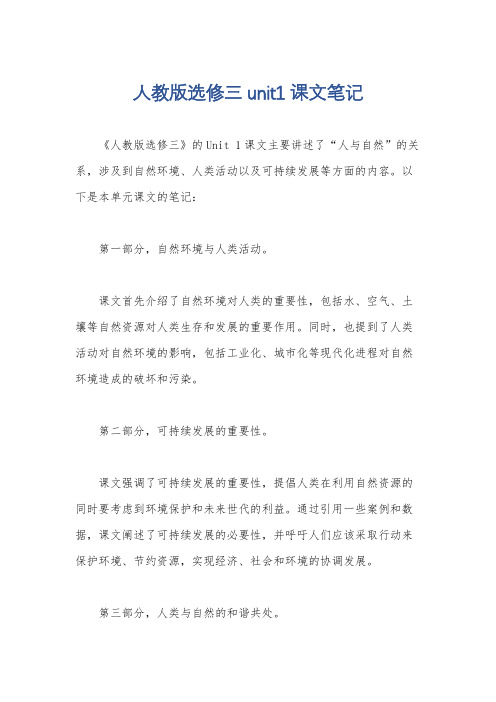
人教版选修三unit1课文笔记
《人教版选修三》的Unit 1课文主要讲述了“人与自然”的关系,涉及到自然环境、人类活动以及可持续发展等方面的内容。
以下是本单元课文的笔记:
第一部分,自然环境与人类活动。
课文首先介绍了自然环境对人类的重要性,包括水、空气、土壤等自然资源对人类生存和发展的重要作用。
同时,也提到了人类活动对自然环境的影响,包括工业化、城市化等现代化进程对自然环境造成的破坏和污染。
第二部分,可持续发展的重要性。
课文强调了可持续发展的重要性,提倡人类在利用自然资源的同时要考虑到环境保护和未来世代的利益。
通过引用一些案例和数据,课文阐述了可持续发展的必要性,并呼吁人们应该采取行动来保护环境、节约资源,实现经济、社会和环境的协调发展。
第三部分,人类与自然的和谐共处。
课文最后强调了人类与自然的和谐共处的重要性,提倡人们应
该尊重自然、保护自然、与自然和谐相处。
同时,也提到了人类在
实现与自然和谐共处的过程中需要进行环境教育和意识的转变。
总结:
本单元课文通过对自然环境、人类活动以及可持续发展的讨论,引发了对人与自然关系的思考。
同时,也提出了一些解决环境问题
的建议和措施,对于培养学生的环境意识和可持续发展观念具有一
定的启发意义。
希望以上笔记能够帮助你更好地理解《人教版选修三》Unit 1
的课文内容。
如果你还有其他问题,也欢迎继续提出。
外研版九年级上册英语m3u1课文
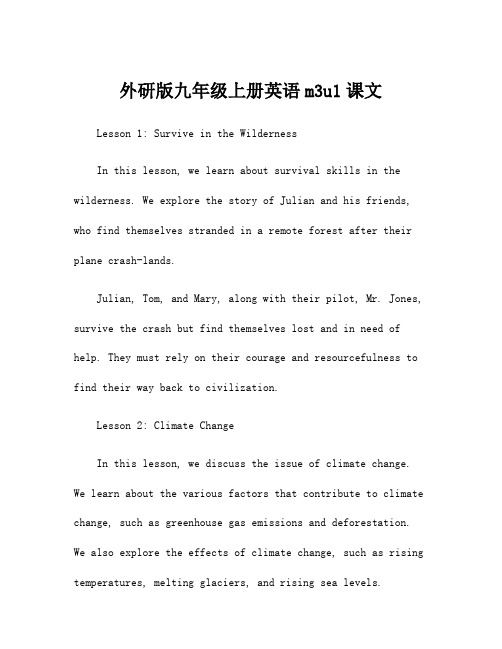
外研版九年级上册英语m3u1课文Lesson 1: Survive in the WildernessIn this lesson, we learn about survival skills in the wilderness. We explore the story of Julian and his friends, who find themselves stranded in a remote forest after their plane crash-lands.Julian, Tom, and Mary, along with their pilot, Mr. Jones, survive the crash but find themselves lost and in need of help. They must rely on their courage and resourcefulness to find their way back to civilization.Lesson 2: Climate ChangeIn this lesson, we discuss the issue of climate change. We learn about the various factors that contribute to climate change, such as greenhouse gas emissions and deforestation. We also explore the effects of climate change, such as rising temperatures, melting glaciers, and rising sea levels.Lesson 3: Protect Our EnvironmentIn this lesson, we discuss the importance of protecting our environment. We learn about the various ways we can contribute to environmental conservation, such as reducing waste, conserving water, and recycling. We also explore the concept of sustainable development and how it can help us protect the environment for future generations.Lesson 4: The Future of EnergyIn this lesson, we explore the future of energy. We learn about renewable and non-renewable sources of energy and discuss the advantages and disadvantages of each. We also examine the importance of transitioning to renewable energy sources to reduce our reliance on fossil fuels and combat climate change.Lesson 5: Technology and the WorldIn this lesson, we discuss the impact of technology on our world. We explore how advancements in technology have revolutionized various aspects of our lives, such as communication, transportation, and healthcare. We also examine the ethical implications of technological developments, such as privacy concerns and job displacement.Overall, Unit 1 of the Grade 9 English textbook focuses on the changing world and our role in adapting to and preserving it. From surviving in the wilderness to understanding climate change, protecting the environment, exploring future energy sources, and examining technology's impact, this unit aims to broaden students' awareness and understanding of the world we live in.。
高中英语北师大版选修一(2019) Unit 3 Lesson 1
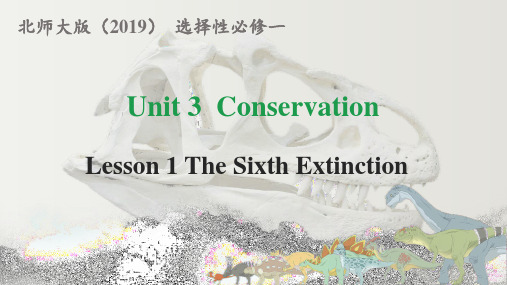
_产__卵__/下__蛋_________ _处__境__危__险__;__受__到_威__胁 _彻__底__毁__灭_________ _消__失__;__绝__迹_;__灭__绝__ __高_达__…__…_________ __简_而__言__之_________ __根_据__;__按__照_______ __采__取_措__施_________ __把__…_…__归__咎__于_____
重点词块
1.at the rate of… 2.be based on… 3.lay eggs 4.be at risk 5.wipe out 6.die out 7.up to… 8.in short 9.according to 10.take steps 11.be to blame
_以__…__…__的__速_度__/_比__例_
to destroy something completely
a set of animals or plants in which members have similar characteristics to each other
the natural environment in which an animal or plant usually lives
Activity 2 Read a text about extinction. Then check your answers in Activity 1.
If a sixth mass extinction occurs, scientists who have studied the issue believe that up to three quarters of all species on Earth could die out. Of course, as we humans depend on so many species for our survival, we would also be at risk of dying out. Our world and our lives depend on the balance in nature between animals and plants. Without forests, we would have no air to breathe, and without clean water we would be unable to survive.
高中英语Unit3ConservationSectionⅠ 课件北师大版选择性必修第一册
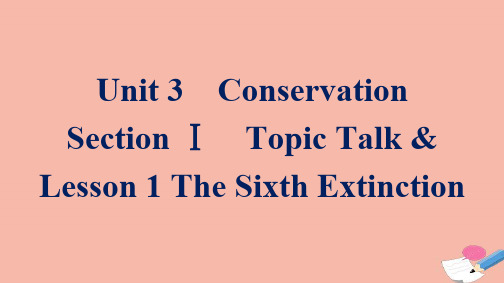
【理解诱思】 What can we learn about the sixth mass extinction? A.Humans are the main cause of it. B.It means a global decline over a long time. C.It occurred towards the end of the Pleistocene. D.Scientists still disagree about the cause of it. 答案:A
词汇新知
一、单词英汉互译 1.conservation /̩kɒnsə̍veIʃən/ n. 保护 2.plastic /̍plæstIk/ adj. 塑料制的 3.illegally /I̍liː əli/ adv. 非法地,违法地 4.extinct /Ik̍stIŋkt/ adj. 灭绝的,绝种的 5.incredibly /In̍kredəbli/ adv. 非常地,极端地 6.endangered /In̍deIndʒəd/ adj. 濒危的 7.solar /̍səʊlə/ adj. 太阳光(能)的
1.wipe out
彻底毁灭
2.cause for concern
引起忧虑
3.be at risk 处境危险,受到威胁
4.solar energy
太阳能
5.off the coast 远离海岸线
6. have a role 7. do one’s part 8. hunt for 9. die out 10. be to blame
二、阅读课文“THE SIXTH EXTINCTION”,选择正确答案 1.Which of the following is not included in the causes for the last five extinctions? D A.Global warming. B.Volcanic eruptions. C.The decrease of the oxygen content of the sea. D.Human activity.
Unit 3 Colors Around Us Lesson 1闽教版(2024)英语三年级上册
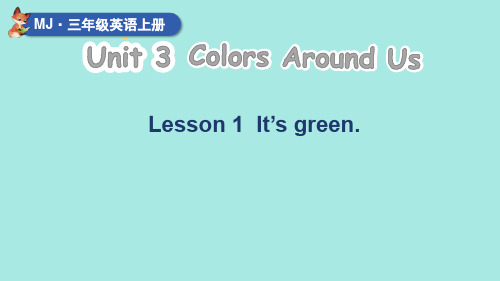
B. green
C. blue
2. —Look! The light is green. —Yes, let’s _____.
A. wait
B. stop
C. go
3. —Good morning, Li Na. —_____
A. Good afternoon, Tom. B. Good morning,
MJ·三年级英语上册
Lesson 1 It’s green.
Enjoy a song
They are on the way to school ...
在……之上; 在……时候
on the way to ...
路,道路; 方式
Look, what are they?
traffic lights
灯;光线; 浅色的
Watch and think
颜色; 给……着色
How many colors are there in the light?
The light is ______.
停止,停 下;车站
红色; 红色的
The light is _______.
黄色; 黄色的
The light is _______.
_S_t_o_p_! Wang Tao. The light is red.
_O__K_! _T_h_a_n_k__y_o_u_.
The light is _______ now.
Can they go now?
Look! It’s green now.
__Y_e_s_, _le_t_’s__g_o__ .
Yes, let’s go.
Watch and repeat
2024年7年级英语教材
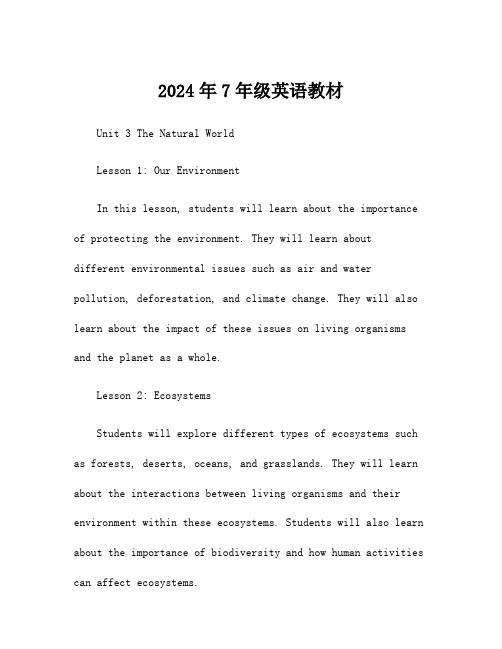
2024年7年级英语教材Unit 3 The Natural WorldLesson 1: Our EnvironmentIn this lesson, students will learn about the importance of protecting the environment. They will learn aboutdifferent environmental issues such as air and water pollution, deforestation, and climate change. They will also learn about the impact of these issues on living organisms and the planet as a whole.Lesson 2: EcosystemsStudents will explore different types of ecosystems such as forests, deserts, oceans, and grasslands. They will learn about the interactions between living organisms and their environment within these ecosystems. Students will also learn about the importance of biodiversity and how human activities can affect ecosystems.Lesson 3: ConservationIn this lesson, students will learn about the concept of conservation and its importance in preserving the natural world. They will explore different conservation efforts suchas wildlife protection, habitat restoration, and sustainable resource management. They will also learn about the role of individuals and communities in conservation efforts.Lesson 4: The Water CycleStudents will learn about the water cycle and its importance in maintaining life on Earth. They will understand the processes of evaporation, condensation, and precipitation, and how they contribute to the distribution of water on the planet. Students will also learn about the significance of water conservation and the impact of human activities on the water cycle.Lesson 5: Climate ChangeIn this lesson, students will explore the concept of climate change and its effects on the environment. They will learn about the causes of climate change such as greenhouse gas emissions and deforestation. Students will also learn about the potential consequences of climate change and the importance of taking action to address this global issue.。
高中英语北师大版选择性必修第一册Unit3ConservationLesson1TheSixthEx
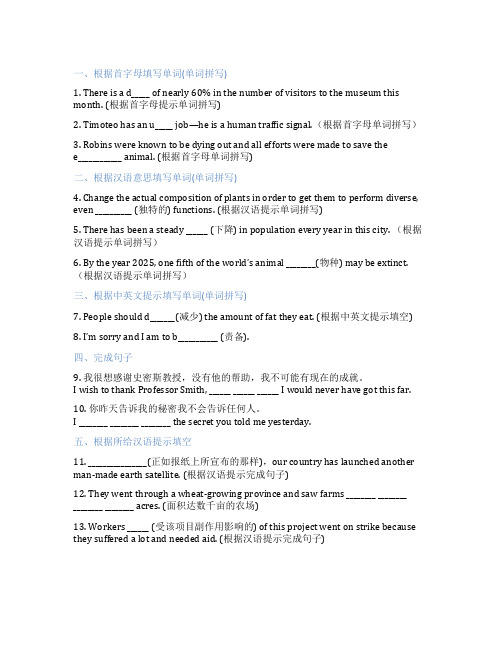
一、根据首字母填写单词(单词拼写)1. There is a d_____ of nearly 60% in the number of visitors to the museum this month. (根据首字母提示单词拼写)2. Timoteo has an u_____ job—he is a human traffic signal.(根据首字母单词拼写)3. Robins were known to be dying out and all efforts were made to save thee____________ animal. (根据首字母单词拼写)二、根据汉语意思填写单词(单词拼写)4. Change the actual composition of plants in order to get them to perform diverse, even __________ (独特的) functions. (根据汉语提示单词拼写)5. There has been a steady ______ (下降) in population every year in this city. (根据汉语提示单词拼写)6. By the year 2025, one fifth of the world’s animal ________(物种) may be extinct. (根据汉语提示单词拼写)三、根据中英文提示填写单词(单词拼写)7. People should d_______(减少) the amount of fat they eat. (根据中英文提示填空)8. I’m sorry and I am to b___________ (责备).四、完成句子9. 我很想感谢史密斯教授,没有他的帮助,我不可能有现在的成就。
I wish to thank Professor Smith, ______ ______ ______ I would never have got this far.10. 你昨天告诉我的秘密我不会告诉任何人。
Unit3AtthetableLesson1(教案)-2023-2024学年重大版英语五年级上册
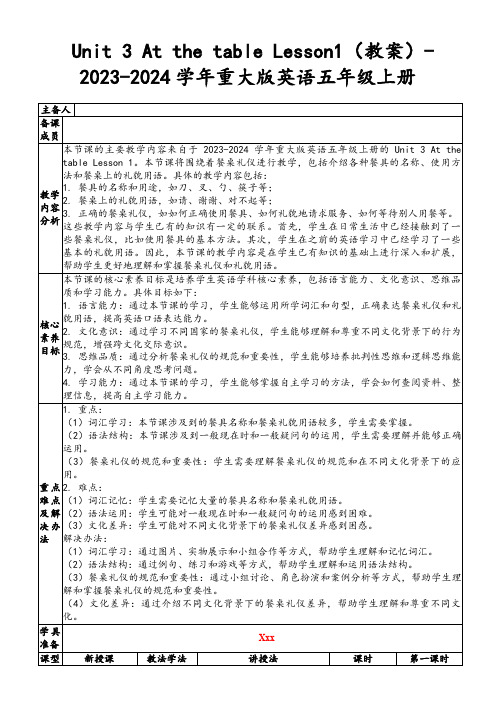
- Chopsticks: Chopsticks are two long, thin sticks used for eating food, especially in Asian countries like China and Japan.
- Knife: A knife is a tool used for cutting food. It is usually used with a fork.
- Fork: A fork is a utensil used for eating food. It is usually used with a knife.
- Thank you: Thank you is a polite word used to express gratitude or appreciation for something someone has done for you. It shows appreciation and respect for others.
Unit 3 At the table Lesson1(教案)-2023-2024学年重大版英语五年级上册
主备人
备课成员
教学内容分析
本节课的主要教学内容来自于2023-2024学年重大版英语五年级上册的Unit 3 At the table Lesson 1。本节课将围绕着餐桌礼仪进行教学,包括介绍各种餐具的名称、使用方法和餐桌上的礼貌用语。具体的教学内容包括:
其次,在课堂活动中,我应该给予学生更多的选择权,让他们根据自己的兴趣和需求选择参与的活动。这样,学生能够更加投入,提高参与度。例如,在设计实践活动时,我可以提供多种活动选项,让学生根据自己的兴趣选择参与。这样,学生能够在自己喜欢的活动中发挥自己的优势,提高学习效果。
九年级同步练习册英语
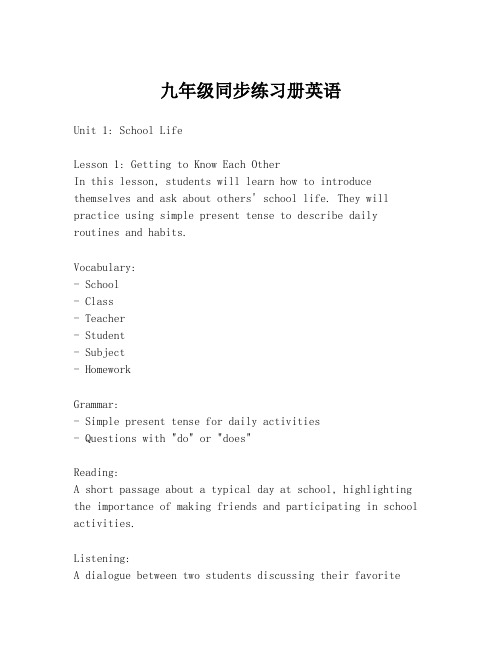
九年级同步练习册英语Unit 1: School LifeLesson 1: Getting to Know Each OtherIn this lesson, students will learn how to introduce themselves and ask about others' school life. They will practice using simple present tense to describe daily routines and habits.Vocabulary:- School- Class- Teacher- Student- Subject- HomeworkGrammar:- Simple present tense for daily activities- Questions with "do" or "does"Reading:A short passage about a typical day at school, highlighting the importance of making friends and participating in school activities.Listening:A dialogue between two students discussing their favoritesubjects and after-school clubs.Speaking:Role-play activities where students take turns introducing themselves and asking about each other's school life.Writing:A short essay describing a perfect school day, including classes, lunchtime, and extracurricular activities.Lesson 2: Classroom Rules and ExpectationsThis lesson will focus on classroom etiquette and the importance of following rules to maintain a positive learning environment.Vocabulary:- Rule- Respect- Quiet- Raise hand- Listen- ParticipateGrammar:- Imperatives for giving instructions- Modal verbs (can, should, must)Reading:A set of classroom rules with explanations on why they are important for a successful school year.Listening:A conversation between a teacher and a student discussing the consequences of breaking classroom rules.Speaking:Group discussions on what students think are the most important classroom rules and why.Writing:A letter to the school principal suggesting new rules or changes to existing ones.Unit 2: Hobbies and InterestsLesson 1: Exploring HobbiesStudents will learn how to talk about their hobbies and interests, and how to ask others about theirs.Vocabulary:- Hobby- Interest- Collection- Club- Activity- SkillGrammar:- Present continuous tense for activities happening now- Adjectives to describe hobbiesReading:An article about different types of hobbies and how they can benefit personal growth and social life.Listening:An interview with a student who has a unique hobby, discussing how they got started and what they enjoy about it.Speaking:Pair work where students interview each other about their hobbies and share their findings with the class.Writing:A diary entry about a recent hobby-related activity, expressing personal feelings and future plans related to the hobby.Lesson 2: Joining ClubsThis lesson will introduce students to the concept of joining clubs and the benefits of participating in group activities.Vocabulary:- Club- Member- Activity- Meeting- Join- OrganizeGrammar:- Future simple tense for plans and predictions- Adverbs of frequencyReading:A description of various school clubs and the skills students can learn by participating.Listening:A presentation by a club leader explaining the club's activities and inviting students to join.Speaking:A debate on the advantages and disadvantages of joining clubs at school.Writing:A proposal to start a new club at school, including theclub's purpose, activities, and potential members.Unit 3: Travel and AdventureLesson 1: Planning a TripStudents will learn vocabulary related to travel and how to discuss travel plans.Vocabulary:- Travel- Destination- Itinerary- Transport- Accommodation- SightseeingGrammar:- Future simple tense for future plans- Adverbs of time and placeReading:A travel brochure for a popular tourist destination, highlighting attractions and activities.Listening:A travel podcast episode with tips on how to plan a successful trip.Speaking:A simulation activity where students plan a trip for a group of friends, considering budget, interests, and time constraints.Writing:A travel diary entry describing a day's activities during a trip, including places visited and personal reflections.Lesson 2: Travel ExperiencesThis lesson will focus on sharing and discussing travel experiences.Vocabulary:- Experience- Adventure- Culture- Souvenir- Guide- ItineraryGrammar:- Past simple tense for recounting past events- Past continuous tense for actions happening at a specific time in the pastReading:A personal travel story about a memorable trip, including challenges faced and lessons learned.Listening:A travel show segment where travelers share their most unforgettable experiences.Speaking:A storytelling session where students recount their own travel experiences or those of family members.Writing:A travel blog post about a recent trip, including descriptions of the places visited, people met, and personal insights gained.Unit 4: Environment and ConservationLesson 1: Understanding the EnvironmentStudents will learn about the natural world and the importance of environmental conservation.Vocabulary:- Environment- Ecosystem- Pollution- Recycling- Conservation- BiodiversityGrammar:- Modal verbs (can, could, should) for expressing ability and suggestions- Countable and uncountable nounsReading:An informative text on the different types of ecosystems and the threats they face.Listening:A。
Unit3ConservationLesson1TheSixthExtinctionReading课
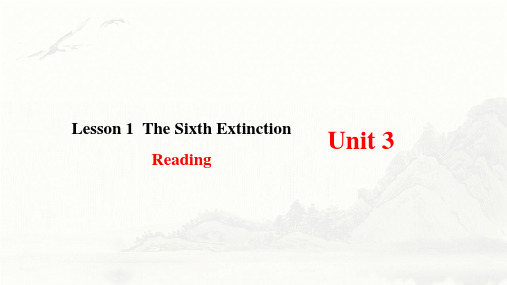
during the mass extinction known as the “Great Dying”?
a. Less than 10%
b. Nearly 50% c. More than 90%
3. What do scientists think will cause the next mass extinction?
How to avoid the sixth mass extinction: _c_h_a_n_g_e_th_e__w_a_y__w_e_l_i_v_e,_i_n_c_lu_d_i_n_g__se_t_ti_n_g_u_p__s_p_ec_i_a_l_ _a_re_a_s_w__h_e_re__p_la_n_t_s_a_n_d_a_n_i_m_a_l_s_c_a_n_b_e__p_ro_t_e_c_te_d_;____ _c_h_a_n_g_e_h_o_w__w_e__w_o_r_k_a_n_d__tr_a_v_e_l _b_y_u_s_i_n_g_c_le_a_n_e_r_, ___ _m_o_r_e_n_a_t_u_ra_l_s_o_u_r_c_e_s _o_f_e_n_e_rg_y_;_i_m__p_ro_v_e__o_u_r _fa_r_m__in_g_ _m_e_t_h_o_d_s______________
Post-reading 5 Group Work. Think and share.
人教版高中英语选择性必修四 Unit 3 第一课时 Reading and Thinking 1
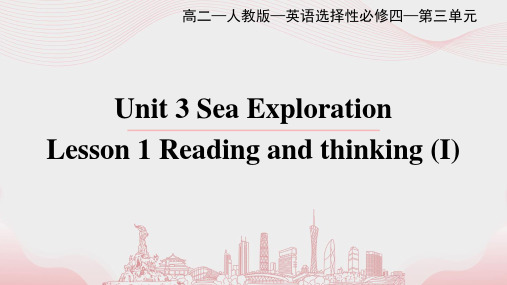
passage; 4. learn about the details including names of people and places.
Lead-in
They (oceans) provide a breeding ground for life, connect the world and promote development. --- Xi Jinping at 2019 China Marine Economy Expo
Xi called for efforts to accelerate marine sci-tech innovation, improve marine development capacity, and foster and strengthen emerging marine industries of strategic importance. (加快海洋科技创新,提高海 洋发展能力,培育并加强具有战略重要性的新兴海洋产业).
The sea is full of life. Even when we cannot see ocean animals, the sea itself is constantly in motion and never standing still. It also has moods, sometimes bright and cheerful, sometimes stormy and angry.
2. Do you know any sea animals?
I know some well-known mammals that live in oceans including whales, seals, dolphins and polar bears.
师大选必U3ConservationLesson1 The sixth extinction 基础练
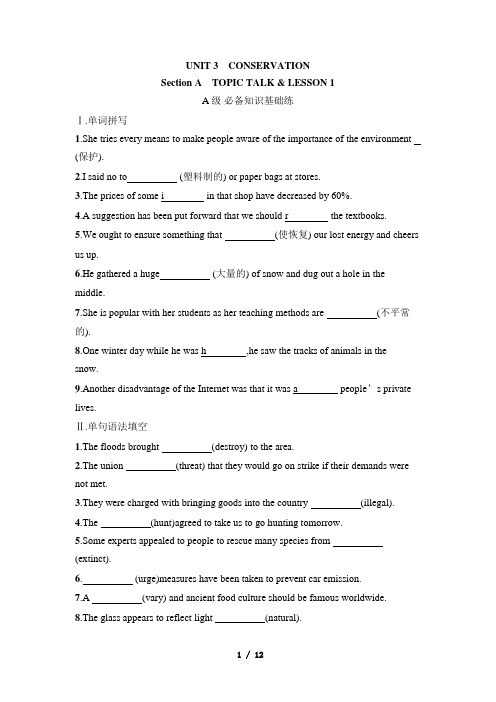
UNIT 3CONSERVATIONSection A TOPIC TALK&LESSON1A级必备知识基础练Ⅰ.单词拼写1.She tries every means to make people aware of the importance of the environment (保护).2.I said no to (塑料制的) or paper bags at stores.3.The prices of some i in that shop have decreased by 60%.4.A suggestion has been put forward that we should r the textbooks.5.We ought to ensure something that (使恢复) our lost energy and cheers us up.6.He gathered a huge (大量的) of snow and dug out a hole in the middle.7.She is popular with her students as her teaching methods are (不平常的).8.One winter day while he was h,he saw the tracks of animals in the snow.9.Another disadvantage of the Internet was that it was a people’s private lives.Ⅱ.单句语法填空1.The floods brought (destroy) to the area.2.The union (threat) that they would go on strike if their demands were not met.3.They were charged with bringing goods into the country (illegal).4.The (hunt)agreed to take us to go hunting tomorrow.5.Some experts appealed to people to rescue many species from(extinct).6. (urge)measures have been taken to prevent car emission.7.A (vary) and ancient food culture should be famous worldwide.8.The glass appears to reflect light (natural).9.We can’t afford to overlook such serious (pollute) to the environment.10.On the other hand,there are always some people who view this gap (negative).Ⅲ.短语填空t in environmental conservation.2.What we can do now is to reduce pollution.3.As a member of the international society,we to play.4.The old traditions are .5.Only in this way can we the enemy troops.6.The drivers were more likely to break the speed limit and of getting fined.7.All the flights were put off the bad weather.8.The government will make accommodations for three thousand people.9.Friendship means having someone I can .10.,he was happy with that result.Ⅳ.完成句子1.去哪儿郊游由你决定。
师大选必Unit3ConservationLesson1The sixthextinction教案
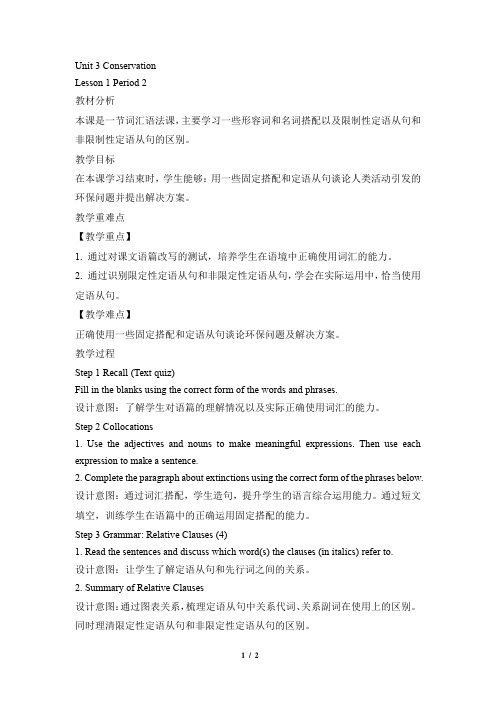
Unit 3 ConservationLesson 1 Period 2教材分析本课是一节词汇语法课,主要学习一些形容词和名词搭配以及限制性定语从句和非限制性定语从句的区别。
教学目标在本课学习结束时,学生能够:用一些固定搭配和定语从句谈论人类活动引发的环保问题并提出解决方案。
教学重难点【教学重点】1. 通过对课文语篇改写的测试,培养学生在语境中正确使用词汇的能力。
2. 通过识别限定性定语从句和非限定性定语从句,学会在实际运用中,恰当使用定语从句。
【教学难点】正确使用一些固定搭配和定语从句谈论环保问题及解决方案。
教学过程Step 1 Recall (Text quiz)Fill in the blanks using the correct form of the words and phrases.设计意图:了解学生对语篇的理解情况以及实际正确使用词汇的能力。
Step 2 Collocations1. Use the adjectives and nouns to make meaningful expressions. Then use each expression to make a sentence.2. Complete the paragraph about extinctions using the correct form of the phrases below.设计意图:通过词汇搭配,学生造句,提升学生的语言综合运用能力。
通过短文填空,训练学生在语篇中的正确运用固定搭配的能力。
Step 3 Grammar: Relative Clauses (4)1. Read the sentences and discuss which word(s) the clauses (in italics) refer to.设计意图:让学生了解定语从句和先行词之间的关系。
2. Summary of Relative Clauses设计意图:通过图表关系,梳理定语从句中关系代词、关系副词在使用上的区别。
- 1、下载文档前请自行甄别文档内容的完整性,平台不提供额外的编辑、内容补充、找答案等附加服务。
- 2、"仅部分预览"的文档,不可在线预览部分如存在完整性等问题,可反馈申请退款(可完整预览的文档不适用该条件!)。
- 3、如文档侵犯您的权益,请联系客服反馈,我们会尽快为您处理(人工客服工作时间:9:00-18:30)。
UNIT 3 THE ENVIRONMENT AND US
LESSON 15
教案
教学目标(Objectives):
1.确保学生认识和理解一些基本单词的意义和简单口头运用(To learn the meaning and simple usages of some words and phrases)。
需要掌握的词组:on the earth
all the things
grow in
part of
2.学习使用本单元重点句型及表达(To use the typical sentences to express)。
需要掌握的句型:
Environments are different.
Some are …
Another are…
3.鼓励学生大胆发言及表达(To encourage the students to express bravely)。
4.培养学生对英语学科的兴趣(To make the students interest in English learning)。
5.增强学生听说读写译的能力(To strengthen the ability of listening, speaking, reading, writing and translating)。
教学重点(Key Points):
在学习了单词的基础上,以单词为载体,进行主要句型的学习,并了解其中的语法现象,根据具体情境,学会交流对话,侧重句型语法学习,交际意向和课外拓展为重点。
教学方法:
游戏,音频,情景教学法,Pair-work两人小组活动,Group-work小组活动,多媒体辅助教学。
教学难点:
学生处于小学阶段,对英语有了初步了解,词汇储备较少,对于五年级下学期学生的要求重
点是在会读会说的基础上,能掌握一些基本单词的拼写和造句,了解一定的语法内涵,与人进行简单沟通交流。
教学准备:
课件、照片素材、音频文件、教学道具。
教学设计:
Step1. Greeting
Step2. Warm-up/Leading(热身/课程导入)
Warm-up Question
1)你如何向别人介绍环境的差异?
2)Survey:
3)Environments are different.
4)Some are … another are…
Step3. Presentation(呈现新课)
1.Words Learning!
1)老师放映课件,用中文询问同学看到了什么?同学们会看到课件上呈现的图画。
2)教师拿出单词卡片,进入重点新词汇学习环节,向同学展示图片,结合PPT上放映的内容,带领同学学习一些新单词。
2. Pronunciation Part!
1)老师介绍本单元重点单词读音及重点音标,带领同学大声朗读。
2)然后老师带领同学进行拓展学习,介绍一些该音标构成的其他单词。
3. Vocabulary Part!
Thing
Environment
Part
Ice
Penguin
Camel
Different
Dry
…
4. Listening Part!
请听对话材料,完成书中所附听力练习!
Listen to the story.
...
5. Reading Part!
教师立足于课本,引导学生课本上的短篇课文。
教师向同学解释对话内容,并让学生反复听读,学习模仿。
Listen to the tape, and read aloud these sentences!
Step4. 小结(Summary)
学生自我总结今天上课所学内容
Step5. Homework!
请课后认真复习本单元语法内容,并朗诵课文对话!Homework:
1.抄写单词十遍。
2.熟悉本课的语法知识。
3.分角色朗读课文。
4.了解本课的情景语境,学会运用新句子造句。
5.将新学习的语法或句型知识跟班级同学相互练习,加强巩固记忆。
6.父母监督孩子家庭作业的完成。
